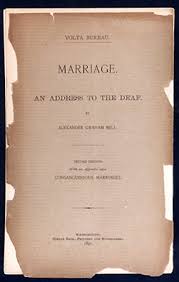Alexander Graham Bell is best known for inventing the telephone, a device that has connected mankind on a global scale since its conception. Strangely enough, this same man spent a portion of his life working to keep people apart. Bell was a firm believer in eugenics, which has been defined as the science of better breeding to improve the human race. [1] He studied the physiology of speech, and believed in oralism. His prejudice targeted Deaf individuals and the close knit communities they had created nationally by the 1900s. The fear and misunderstanding of these communities displayed by Bell is not simply an issue of the past. Disabilities are often viewed as unfortunate aspects of life, instead of celebrated differences. Fear stems from ignorance, and Alexander Graham Bell was ignorant to the importance and value of the community created by those he thought to be less-than himself. Deaf culture is of equal importance to other aspects of society.

Although commonly discussed in regards to race, geographic origin, and appearance, the eugenics movement also negatively impacted those with disabilities and health issues. In 1883 during an address to the National Academy of Sciences, Alexander Graham Bell stated, “Sexual selection is at work among the deaf and dumb. . . . Those who believe as I do, that the production of a defective race of human beings would be a great calamity to the world, will examine carefully the causes that lead to the intermarriages of the deaf with the object of applying a remedy.” [2] Bell believed that the use of American Sign Language in schools, the development of Deaf social programs, and the exposure of Deaf children to Deaf adults were all encouraging the pattern of Deaf intermarriages. Bell believed that by preventing these interactions, and instead using local oral education schools, Deaf individuals would assimilate into mainstream society, and oral education would give Deaf individuals greater access to education and employment. Also, he believed more Deaf-hearing marriages would decrease the number of Deaf children born. He even took steps to introduce legislation that included laws to forbid the marriage of congenitally deaf people as well as laws to prohibit the intermarriage of persons “belonging to families containing more than one deaf-mute”. [3]
Before today, I had never heard Alexander Graham Bell connecting to eugenics. His roots in this ideology run deep, and the National Eugenics Archive does a great job of mapping his connections within the movement on their website. Although the eugenics movement is woven into the fabric of the historic narrative of the Untied States, it is often avoided in discussion or lesson. Confronting eugenics is often associated with the tragedies that occurred during WWII and the Nazi regime, and it is difficult to come to terms with the idea that this movement was not an isolated event. Eugenics was an international movement throughout Europe, the United States, and Latin America before Hitler’s rise to power. [4] Although usually thought of in regards to the Nazis’ orchestrated mass murder of Jews, homosexuals, gypsies, and the disabled, only considering the Holocaust when analyzing eugenics creates a sense of historic amnesia of the various goals and the widespread acceptance of eugenicists, not just by the public, but by leading scientific and academic communities well into 20th century. [5]

A major misconception in regards to disability is the idea that those dealing with differences, such as deafness, are afflicted groups. The deaf communities who confronted Alexander Graham Bell’s notions did not consider themselves to be suffering, or less-than. Instead, powerful community institutions, schools, and Deaf-awarness actions were created with pride. Communication is a shared responsibility. [6] Taking the time to appreciate and understand cultures different from your personal norms is key to avoiding movements, such as eugenics, in the future. While it is easy to find parallels in modern times to this irrational fear of differences, understanding that the human experience is not monolithic, and discussing instead of avoiding issues of the past, is a great way to bring the experiences and unique traits of various cultures to light.
Notes:
- Burke, Chole S., and Christopher J. Castaneda. “The Public and Private History of Eugenics: An Introduction.” The Public Historian 29, no. 3 (2007): 6.
- Edwards, R.A.R. “Chasing Aleck: The Story of a Dorm.” The Public Historian 29, no. 3 (2007): 90.
- Ibid, 91.
- Burke and Castaneda, 8.
- Ibid, 9.
- Edwards, 92.
This is an interesting post. I also didn’t know that Alexander Graham Bell was involved in eugenics. What struck me is how paternalistic he was – he seemed to think he would be helping the Deaf community by forcing them to be oral while completely ignoring their own ideas about what was best for them.
I also, had no idea that Alexander Graham Bell had a connection to eugenics. And I agree with Emily, it’s fascinating that he was obviously set in a belief that he was doing what was best for people in the deaf community. He wasn’t viewing them as potential successful members of society that simply lived within a different culture; instead he was viewing them as inferior.
I like your point about how only talking about eugenics in the context of Nazi atrocities leads to historical amnesia. By using such a well-known figure as Alexander Graham Bell as the subject to talk about eugenics in the United States, you do a good job of showing how pervasive the idea that some people did not deserve to reproduce was.
I think this really demonstrates how history needs to discuss all angles, especially in early education. Human fallibility is ever present, however society tends to fall in the habit of glorifying people and ignoring glaring issues we can learn from, such as this.